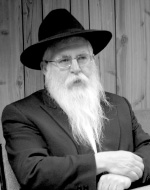Translated and presented by Boruch Merkur
“Although there are those who are embarrassed to say this, this Chassid wasn’t embarrassed and wrote the truth.” * Following the histalkus of the Rebbe Rayatz, the Rebbe MH”M proclaimed that the Rebbe remains alive as before. * Source materials on this topic, compiled by Rabbi Majeski in Likkutei M’koros. (Translations appear in bold. Underlining is the author’s emphasis.)
 On Rosh Chodesh Sivan of 5710, the Rebbe MH”M spoke about how the Rebbe Rayatz’s house is not just a private domain for his personal use but a home for all Jewish people. Thus, details regarding his house are relevant to us all.
On Rosh Chodesh Sivan of 5710, the Rebbe MH”M spoke about how the Rebbe Rayatz’s house is not just a private domain for his personal use but a home for all Jewish people. Thus, details regarding his house are relevant to us all.
Following the purchase of his house, it was ten years before the Rebbe Rayatz paid off the mortgage – a certain Chassid merited to be the one to pay off the remaining debt. The Rebbe MH”M points out that the Rebbe does not receive assistance from just anyone. To illustrate this point, he tells a story of how the Rebbe Rayatz even rejected an offer of maamud (money given to a Rebbe by his Chassidim for the Rebbe’s personal use) from a Jew who was not a Chassid. The man was not phased. He simply offered to become the Rebbe’s Chassid. But the Rebbe refused, saying, “Becoming a Chassid does not begin with that [with having the merit of giving maamud].”
Indeed, it is a great merit for a person to have the Rebbe accept support from him. Once, the Rebbe Rayatz even stated that he is not here to receive but to give. In fact, the person who had the merit of giving to the Rebbe Rayatz, paying off his mortgage, benefited by receiving hashpaa [i.e., assistance of some sort, be it spiritual or perhaps in the form of advice] from the Rebbe with regard to his own home. And the Rebbe MH”M continues:
The influence of the Rebbe extends to others even now. Although what happened on Yud Shvat took place – that does not affect the Rebbe’s hashpaa that exists even now; the same principle applies today: he is not here to receive but to give.
I received a letter from a Chassid where he refers to my revered father-in-law, the Rebbe (after his histalkus), as “der Rebbe zahl gezunt zain – the Rebbe, may he be well.” I was truly pleased with [seeing] that expression [used after Yud Shvat].” Indeed, [wishing the Rebbe good health even after Yud Shvat] is truthful [and appropriate], because his health is not dependent upon physical concerns but spiritual matters (as discussed in Igeres HaKodesh (Tanya Igeres HaKodesh siman 27): “The life of a tzaddik is not physical life but spiritual life, which is faith, and [the] fear and love [of G-d].” In our context, when we speak about the “life of a tzaddik,” leader of the Jewish people, [his life, his well being, is dependent upon hearing] good tidings about activities done to strengthen Judaism, the love of G-d, the love of Torah, and the love of a fellow Jew.) Thus, it is appropriate to say, “der Rebbe zahl gezunt zain.” Although there are those who are embarrassed to say this, this Chassid ignored the concern of embarrassment and wrote the truth.
Of course, if this is so – that now the Rebbe is not limited and he is [rather] present everywhere – how do we have the audacity to sit here and farbreng [before him]? It is because not only is the Rebbe not offended that we are farbrenging – and that Yosel is pouring mashke, and so on – on the contrary, (as stated repeatedly) the Rebbe wants us to farbreng.
Once, [before his histalkus] the Rebbe wanted to listen to the Chassidim farbrenging in the beis midrash below, but he was concerned that were he to come downstairs it would cause a disturbance. Therefore, he set up a system whereby upstairs he could hear what was going on downstairs, and he listened to the farbrengen.
And although, for the sake of showing proper respect to the Rebbe, it is forbidden to speak in his presence (see Rambam’s Laws of Torah Study 5:2), the general concept of “place upon you a king” “so that his fear is upon you” is dependent upon the physical reality, as his inner being is beheld through a physical garment: his body and clothing. And similarly with regard to his property – that one mustn’t touch a king’s scepter, etc. (Rambam’s Laws of Kings Ch. 2, beg.). In our case, however, this does not apply.
(Ibid 82-83)